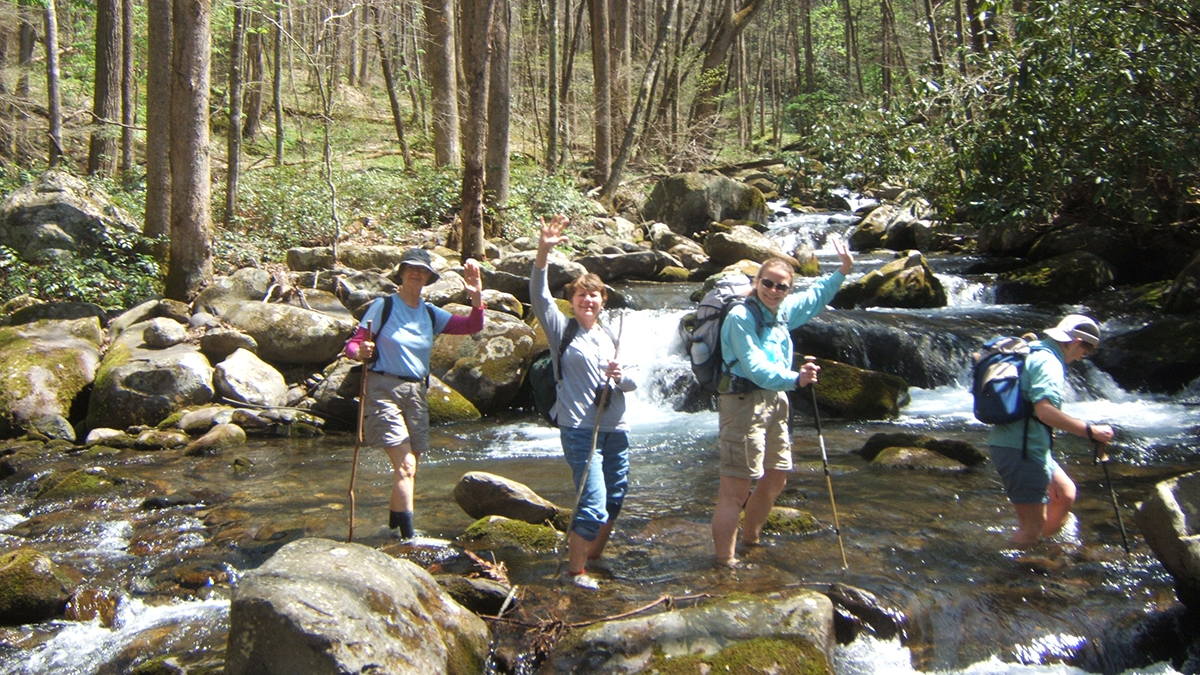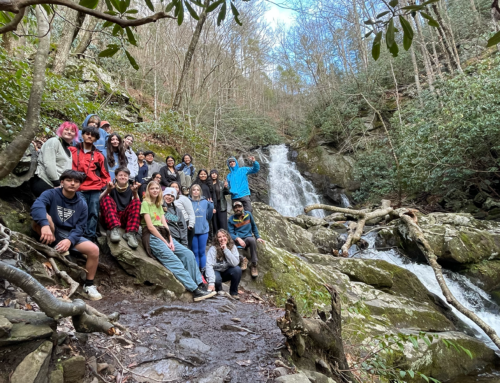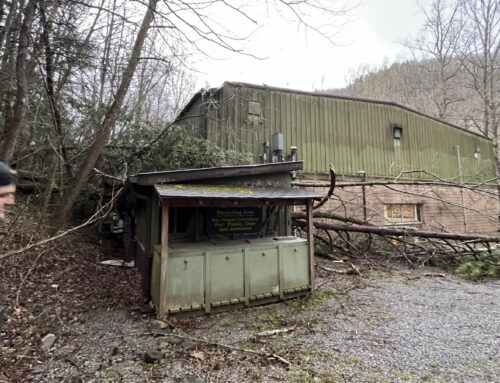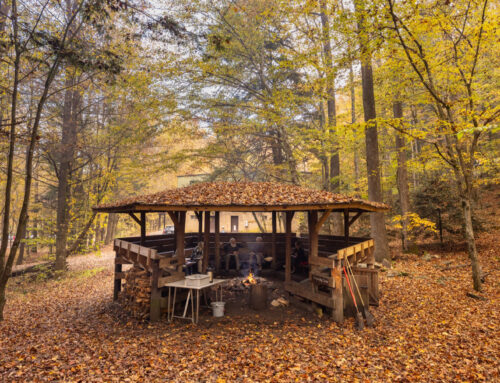Written by Jeremy Lloyd, Manager of Field Programs and Collegiate Studies. Pictured above, Sandy is waving on the left.
I have been thinking lately about my friend Sandy McHone who died last year at age 84, and a poem by W.H. Auden titled “For the Time Being.” Sandy set a Tremont record by attending more than twenty-eight hiking programs. Auden’s Advent-themed poem got me thinking about the nature of time and our place in it and the times I shared with Sandy.
Sandy was one of those uncommon individuals who didn’t care if she hiked the same trail a hundred times. She didn’t come to Tremont mainly for thrills or new experiences. She sought community, and she both found it and helped nurture it. In large part because of her gracious spirit and refusal to take anything too seriously—even her aches and pains—community grew around her. Friends she made here kept in touch afterward, and many returned again and again from Mississippi, Georgia, Louisiana, Florida, or Texas, just like Sandy did. Before long, roughly a third of hiking week participants were comprised of such folks, and the number kept growing.
Sandy’s optimism, balanced with her knack for blunt truth-telling, made my job easier to keep the tone positive among thirty-some adults who were tired and sore at the end of each day.
“Some of the ladies were complaining in the dorm last night about your rating system for the hikes,” she once told me. “They think the ‘moderate’ hikes should instead be rated ‘difficult.’ I told them they’re getting old! So am I, but you adjust and keep going. The world doesn’t change just because you have.”
“I told them they’re getting old! So am I, but you adjust and keep going. The world doesn’t change just because you have.”
Sandy earned a reputation for being injury- and accident-prone and never denied it. During her first week here, she twice closed a metal trowel (used when going to the bathroom in the woods) on her hand and bled profusely. While clambering through a thicket choked with blackberry and greenbrier, she was stung by yellow jackets eleven times. Once, after losing her balance and falling off the trail, she kept hollering my name until I came and pulled her back up. Another time, after returning injury-free from a hike, she managed to trip inside the dining hall and needed stitches.
Through all this, she never once complained or let it slow her down. Just weeks after breaking her arm in her backyard, she shoved off for Jackson Hole to go snowshoeing, cross-country skiing, and dog-sledding.
“Tremont is my favorite place in the whole world,” she told me countless times. Her dream for once she got too old to hike was to keep coming back, sit in a rocking chair inside the pavilion, and attend the many evening programs she loved: Elizabeth Rose’s storytelling, Lost Mill String Band’s old-timey music, and especially, visiting the cemetery to hear the story of Vannie Cook and others who once populated Walker Valley.
An accident at home led to declining health and prevented her from returning. Sandy and I traded cards and talked on the phone, never knowing—or maybe just never admitting—we would never get to hike together again. As 2023 begins, I’m still in denial over the fact that this will be another year I won’t see her.
Near the end of his book-length poem about Christmas, Auden includes these sobering words:
Well, so that is that. Now we must dismantle the tree,
Putting the decorations back into their cardboard boxes—
Some have got broken—and carrying them up to the attic.
The holly and mistletoe must be taken down and burnt,
And the children got ready for school.
The post-holiday blues many feel this time of year has set in for me too. I’ve chosen, however, to regard these dark days of winter as an opportunity for reflection, slowing down, and being attentive to time and others.
Auden also writes, “The Time Being is, in a sense, the most trying time of all…. We look round for something, no matter what, to inhibit our self-reflection….” He’s describing human nature and our tendency to find ways to distract ourselves, fill the void, and do anything to avoid being alone with our thoughts and feelings and ask ourselves what matters in the long run.
Resisting this temptation can bear fruit, even if it means acknowledging sitting with the irreversible losses in our lives for a time. Among other things, it can serve as a simple reminder that we have touched another’s life and been touched by theirs, which sure beats the alternative of never having connected with that person.
Whether you are grieving the loss of a loved one, experiencing joy, anticipating what lies ahead for you this year, or a combination of these things, know this: when you come to Tremont and find your experience making an impact on your life, so do you make an impact on others—staff and fellow participants alike—just as Sandy and many others left on me.
I hope you find time for reflection this winter, to celebrate life and realize the regenerative power of connecting not just with places but with other people. And I hope to see you in 2023.







